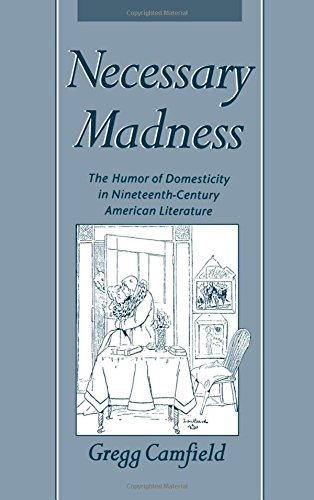Necessary Madness: The Humor of Domesticity in Nineteenth-Century American Literature / Gregg Camfield
| List Price: | |
Our Price: $170.00 | |
|
For Bulk orders
| |
|
Used Book Price: $23.91 | |
| Necessary Madness: The Humor of Domesticity in Nineteenth-Century American Literature / Gregg Camfield | |
| Publisher: Oxford University Press | |
| Availability:Usually ships in 24 hours | |
| Sales Rank: 4848647 | |
|
In this rich, exciting new book, Gregg Camfield explores nineteenth-century American humor from the perspective of gender and domestic ideology, challenging recent theory asserting a broad gulf between men's and women's humor during the period and contributing vital new insights to the study of humor in general.
Capturing in part I a vision of humor unique to the era, Camfield examines the period's faith in what was called "amiable humor," a genial and supple comic mode whose non- aggression makes it resist easy assimilation to theories stressing humor's basis in hostility, negation, rage, and other combative or displaced energies. Seeking to illuminate this distinct comedy, Camfield probes a related, central cultural strand--the domesticity ideal--that so often is a subject of this humor, carefully tracking contact between the two discourses and identifying their common social and intellectual roots. Turning next to four literary case-studies powerfully revealing of this contact, Camfield in part II pairs male and female humorists--Washington Irving and Fanny Fern; Harriet Beecher Stowe and Herman Melville; Mark Twain and Marietta Holley; and George Washington Harris and Mary Wilkins Freeman--not only to demonstrate the way these influential writers approach domesticity with genial humor, but also to support his claim that gender difference does not always correlate to differences in viewpoint and practice within this common style. Where many argue nineteenth- century women's humor constitutes a genre unto itself, Camfield finds that like women, men filtered reaction to the constraints and opportunities of home life through genial comedy, and that women, like their male counterparts, wrote humor marked by extravagance, expansion, caricature, fantasy, and posturing. Broadening out to an intriguing consideration of humor theory in part III, Camfield draws on recent work in psychology, culture studies, neo-pragmatist philosophy, and neuroscience to model a compelling alternative view of humor capable of negotiating both the complexities of nineteenth-century American humor and the comic art of periods before and since. Students and scholars of humor, nineteenth-century American literature and culture, and women's writing, will find Necessary Madness to be a provocative, essential achievement.
In this rich, exciting new book, Gregg Camfield explores nineteenth-century American humor from the perspective of gender and domestic ideology, challenging recent theory asserting a broad gulf between men's and women's humor during the period and contributing vital new insights to the study of humor in general.
Capturing in part I a vision of humor unique to the era, Camfield examines the period's faith in what was called "amiable humor," a genial and supple comic mode whose non- aggression makes it resist easy assimilation to theories stressing humor's basis in hostility, negation, rage, and other combative or displaced energies. Seeking to illuminate this distinct comedy, Camfield probes a related, central cultural strand--the domesticity ideal--that so often is a subject of this humor, carefully tracking contact between the two discourses and identifying their common social and intellectual roots. Turning next to four literary case-studies powerfully revealing of this contact, Camfield in part II pairs male and female humorists--Washington Irving and Fanny Fern; Harriet Beecher Stowe and Herman Melville; Mark Twain and Marietta Holley; and George Washington Harris and Mary Wilkins Freeman--not only to demonstrate the way these influential writers approach domesticity with genial humor, but also to support his claim that gender difference does not always correlate to differences in viewpoint and practice within this common style. Where many argue nineteenth- century women's humor constitutes a genre unto itself, Camfield finds that like women, men filtered reaction to the constraints and opportunities of home life through genial comedy, and that women, like their male counterparts, wrote humor marked by extravagance, expansion, caricature, fantasy, and posturing. Broadening out to an intriguing consideration of humor theory in part III, Camfield draws on recent work in psychology, culture studies, neo-pragmatist philosophy, and neuroscience to model a compelling alternative view of humor capable of negotiating both the complexities of nineteenth-century American humor and the comic art of periods before and since. Students and scholars of humor, nineteenth-century American literature and culture, and women's writing, will find Necessary Madness to be a provocative, essential achievement.
Now you can buy Books online in USA,UK, India and more than 100 countries.
*Terms and Conditions apply
Disclaimer: All product data on this page belongs to .
.
No guarantees are made as to accuracy of prices and information.
Capturing in part I a vision of humor unique to the era, Camfield examines the period's faith in what was called "amiable humor," a genial and supple comic mode whose non- aggression makes it resist easy assimilation to theories stressing humor's basis in hostility, negation, rage, and other combative or displaced energies. Seeking to illuminate this distinct comedy, Camfield probes a related, central cultural strand--the domesticity ideal--that so often is a subject of this humor, carefully tracking contact between the two discourses and identifying their common social and intellectual roots. Turning next to four literary case-studies powerfully revealing of this contact, Camfield in part II pairs male and female humorists--Washington Irving and Fanny Fern; Harriet Beecher Stowe and Herman Melville; Mark Twain and Marietta Holley; and George Washington Harris and Mary Wilkins Freeman--not only to demonstrate the way these influential writers approach domesticity with genial humor, but also to support his claim that gender difference does not always correlate to differences in viewpoint and practice within this common style. Where many argue nineteenth- century women's humor constitutes a genre unto itself, Camfield finds that like women, men filtered reaction to the constraints and opportunities of home life through genial comedy, and that women, like their male counterparts, wrote humor marked by extravagance, expansion, caricature, fantasy, and posturing. Broadening out to an intriguing consideration of humor theory in part III, Camfield draws on recent work in psychology, culture studies, neo-pragmatist philosophy, and neuroscience to model a compelling alternative view of humor capable of negotiating both the complexities of nineteenth-century American humor and the comic art of periods before and since. Students and scholars of humor, nineteenth-century American literature and culture, and women's writing, will find Necessary Madness to be a provocative, essential achievement.
In this rich, exciting new book, Gregg Camfield explores nineteenth-century American humor from the perspective of gender and domestic ideology, challenging recent theory asserting a broad gulf between men's and women's humor during the period and contributing vital new insights to the study of humor in general.
Capturing in part I a vision of humor unique to the era, Camfield examines the period's faith in what was called "amiable humor," a genial and supple comic mode whose non- aggression makes it resist easy assimilation to theories stressing humor's basis in hostility, negation, rage, and other combative or displaced energies. Seeking to illuminate this distinct comedy, Camfield probes a related, central cultural strand--the domesticity ideal--that so often is a subject of this humor, carefully tracking contact between the two discourses and identifying their common social and intellectual roots. Turning next to four literary case-studies powerfully revealing of this contact, Camfield in part II pairs male and female humorists--Washington Irving and Fanny Fern; Harriet Beecher Stowe and Herman Melville; Mark Twain and Marietta Holley; and George Washington Harris and Mary Wilkins Freeman--not only to demonstrate the way these influential writers approach domesticity with genial humor, but also to support his claim that gender difference does not always correlate to differences in viewpoint and practice within this common style. Where many argue nineteenth- century women's humor constitutes a genre unto itself, Camfield finds that like women, men filtered reaction to the constraints and opportunities of home life through genial comedy, and that women, like their male counterparts, wrote humor marked by extravagance, expansion, caricature, fantasy, and posturing. Broadening out to an intriguing consideration of humor theory in part III, Camfield draws on recent work in psychology, culture studies, neo-pragmatist philosophy, and neuroscience to model a compelling alternative view of humor capable of negotiating both the complexities of nineteenth-century American humor and the comic art of periods before and since. Students and scholars of humor, nineteenth-century American literature and culture, and women's writing, will find Necessary Madness to be a provocative, essential achievement.
Now you can buy Books online in USA,UK, India and more than 100 countries.
*Terms and Conditions apply
Disclaimer: All product data on this page belongs to
 .
.No guarantees are made as to accuracy of prices and information.










